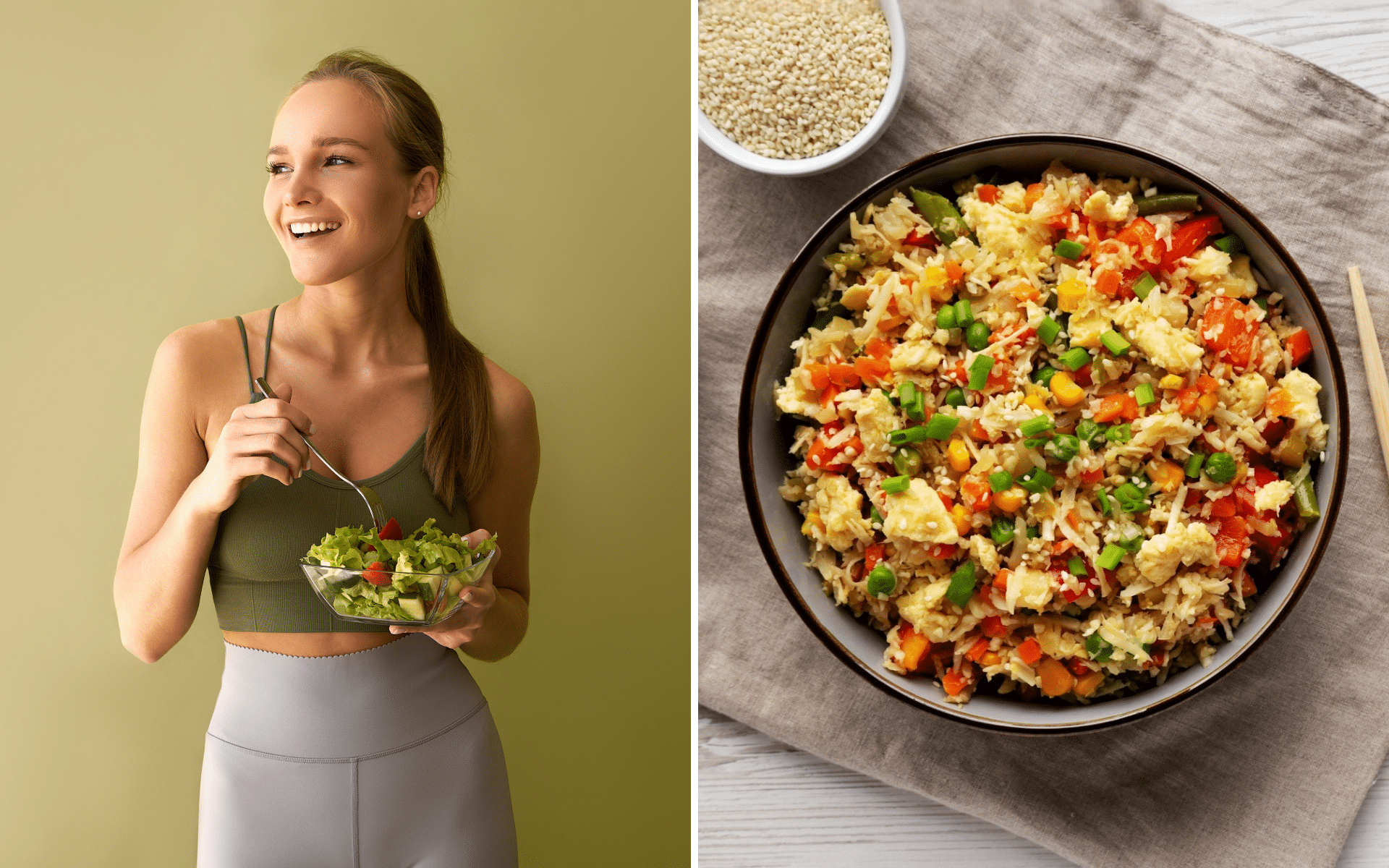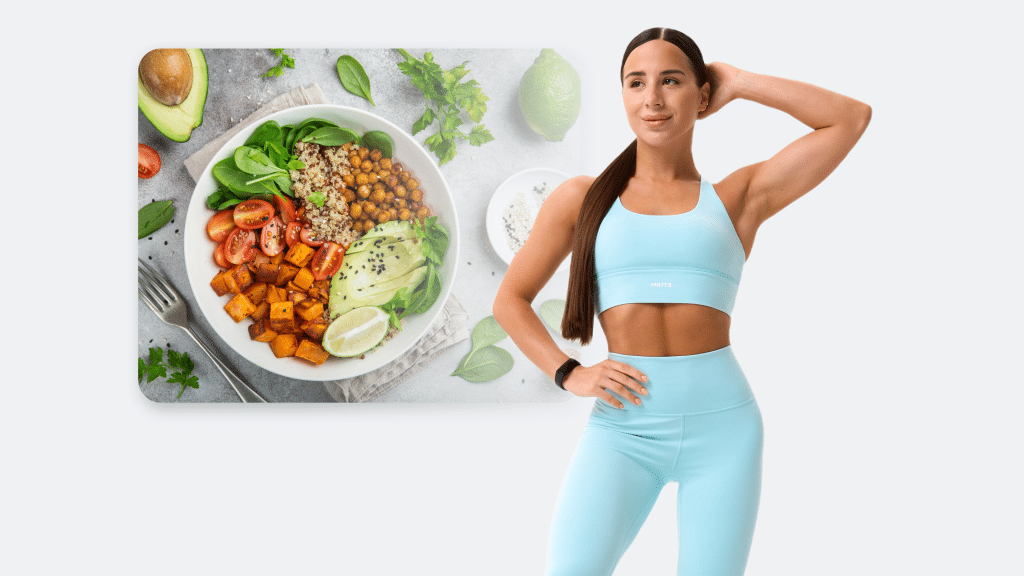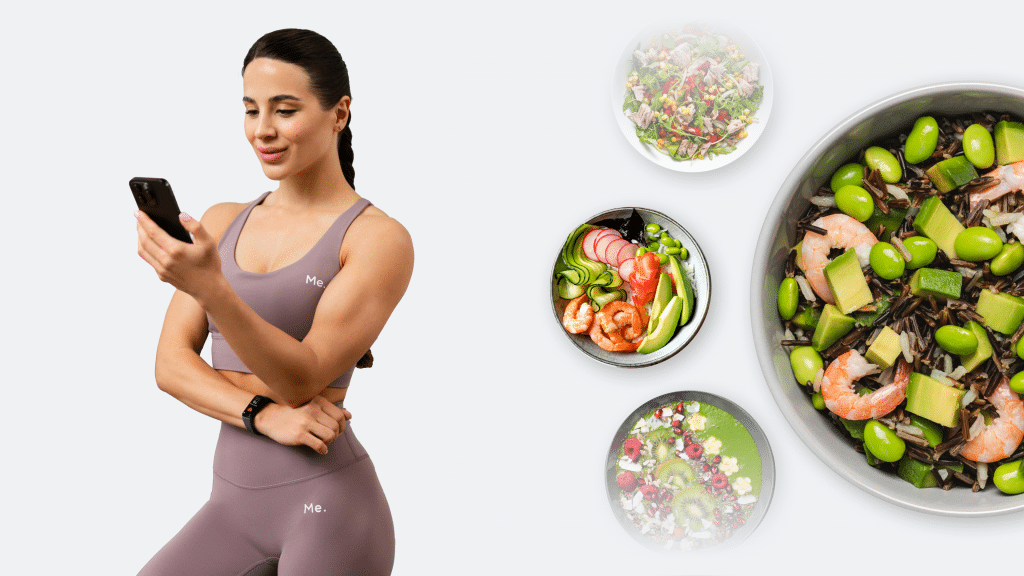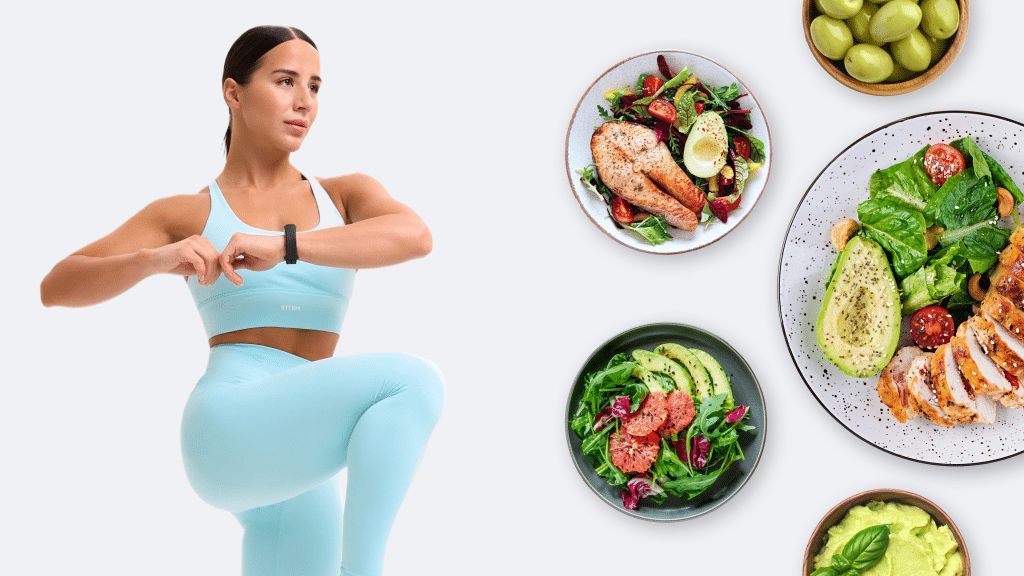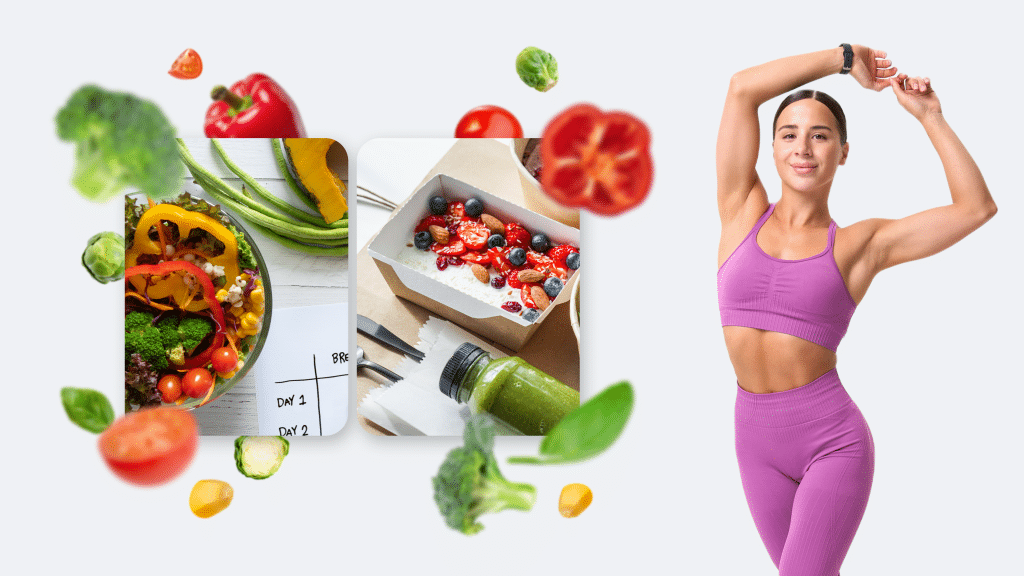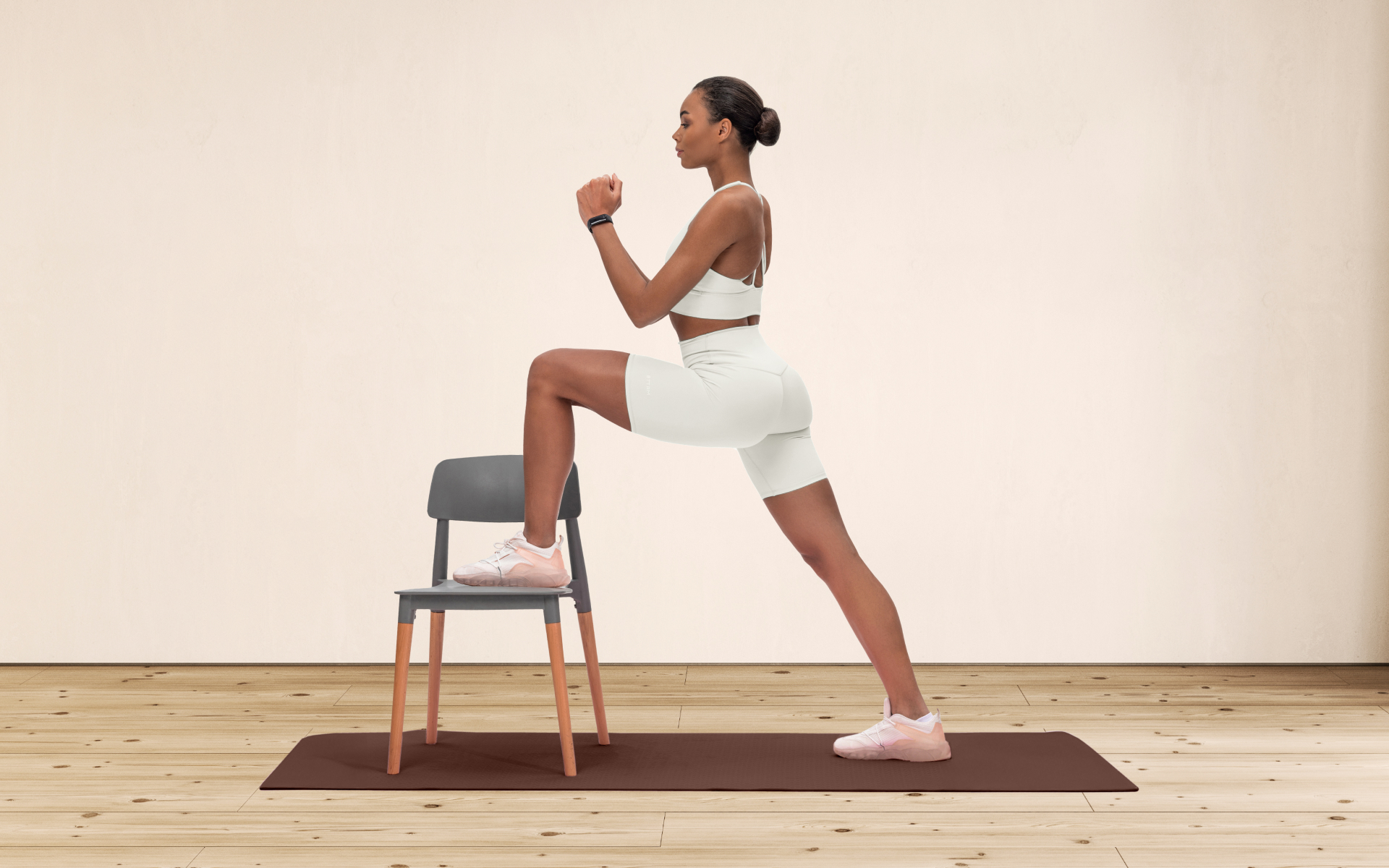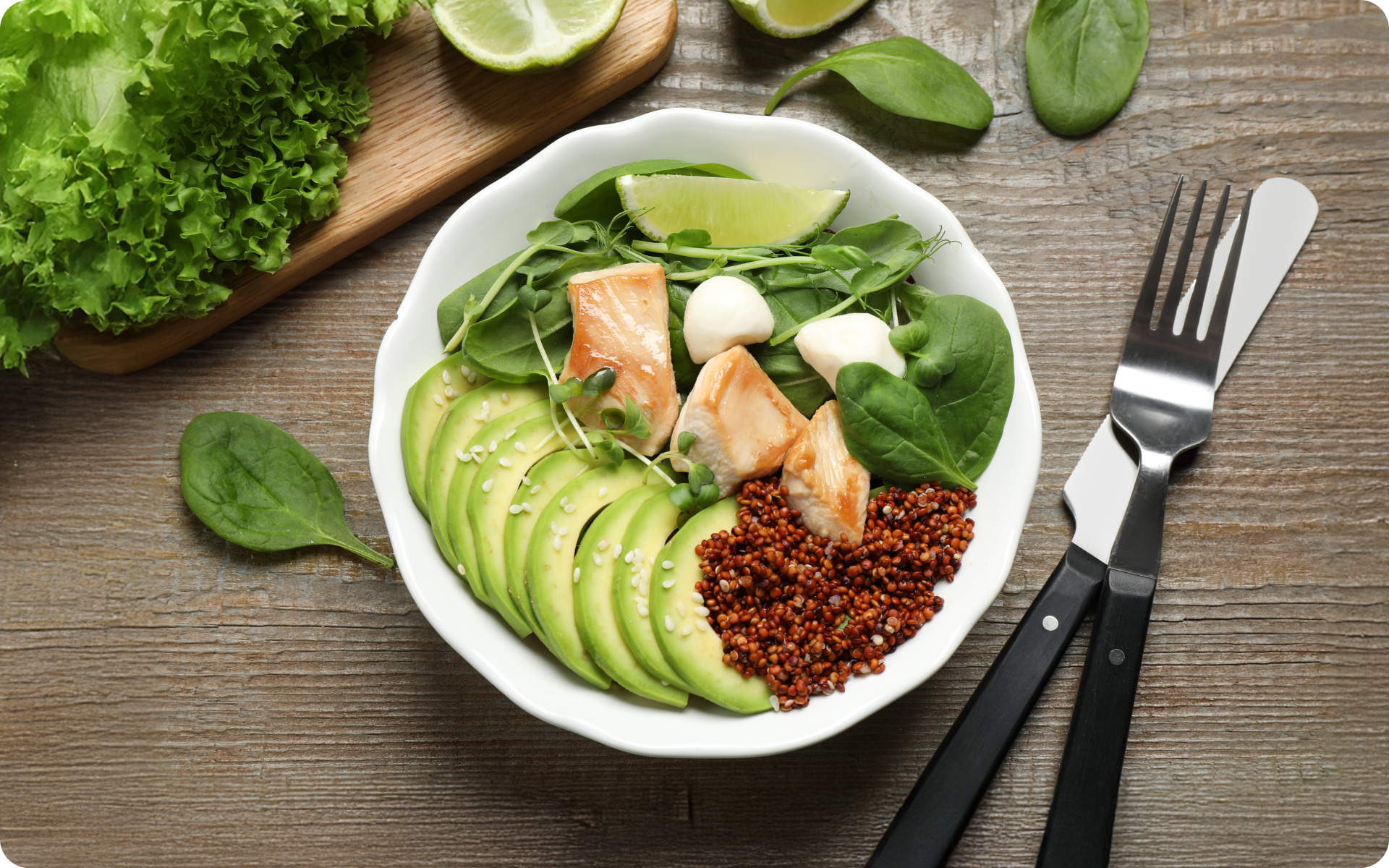For many gym enthusiasts and bodybuilders, a 2,100-calorie meal plan is quite low for their recommended daily caloric intake. However, when cutting, this eating plan may help some of them reach their goals. Read on to find out how a 2,100-calorie meal plan can help you achieve your fitness goals.
What Is Cutting in Bodybuilding?
Cutting or the cutting phase is where bodybuilders reduce their calorie intake, consuming foods in a calorie deficit in order to shed body fat and maintain muscle mass. The goal with any cutting diet is for the individual to become as lean as possible.
Cutting is the opposite of bulking, where the latter is a phase in which bodybuilders eat a lot more calories and also work out harder using heavier weights to build as much muscle as possible.
Check out this article to learn more details about a clean bulking meal plan for optimal results.
2,100-Calorie Meal Plan Bodybuilding: Can You Gain Muscle on This Eating Plan?
Yes and no. Gaining muscle on such a diet largely depends on your individual energy needs, lifestyle, and what your body was like before you started this meal plan.
To expound on this, we must look at this in two ways
-
Bodybuilders
Bodybuilders, especially competitive bodybuilders, tend to cycle between two eating and exercise phases, namely bulking and cutting (1). As explained above, while in the bulking phase, they eat more calories than normal (which means they’re in a calorie surplus) and they also put in more time at the gym in order to build muscle(2).
A study published in 2019 stated that during this bulking phase, bodybuilders should increase their daily caloric intake by 10% to 20% (3). Further research has also shown that some bodybuilders, particularly males, can even consume as much as 3,800 kcal a day while in the bulking phase (4).
As cutting is the opposite of bulking, bodybuilders aren’t looking to build any muscle. As explained above, the muscle is built in the bulking phase. Cutting works to simply maintain the muscle and reduce the fat that they gained while in a calorie surplus during bulking.
Because these people are now eating less than they ate before and not exercising as heavily as before, gaining any more muscle mass can be difficult. Therefore, for seasoned and competitive bodybuilders, especially males, a 2,100-calorie meal plan probably won’t lead to any more muscle gain.
BetterMe: Health Coaching app helps you achieve your body goals with ease and efficiency by helping to choose proper meal plans and effective workouts. Start using our app and you will see good results in a short time.
-
The Average Person
According to the Dietary Guidelines for Americans 2020 – 2025, the estimated calorie needs for women range from 1,600 kcal to 2,400 kcal, while for men, the number is between 2,000 kcal and 3,000 kcal (5). Where you fall within these ranges will vary based on factors such as age and activity level.
As we’ve seen in the ‘bodybuilders’ section above, the two main basics behind muscle gain are your diet and your workout routine. If you want to increase your muscle mass, it’s imperative that you provide your body with appropriate amounts of calories and nutrients, particularly protein.
Research has suggested that in terms of macronutrients, protein plays the biggest role in building muscle mass (6, 1). In fact, even with competitive bodybuilders, the study showed that the intake of protein remains higher than normal regardless of whether they’re in a bulking or cutting phase
Don’t disregard your carbohydrates and fats. These two macronutrients help with energy production in the muscles, which is what you need to support the heavier workouts that you will be doing (6).
So what does this mean for the average person? Can a 2,100-calorie meal plan help with bodybuilding?
Yes, it can, but only if the man or woman in question requires less than 2,100 kcal a day to maintain their weight. Bulking requires a 300 to 500 caloric surplus.
So, regardless of your gender, if your normal daily calorie needs are between 1,600 and 1,800 kcal, by increasing your workouts, especially by doing more resistance training exercises with heavier weights, and consuming a 2,100-calorie meal plan high-protein diet, you should be able to gradually increase your muscle mass over time.
Read more: Building Muscle with Intermittent Fasting: What You Need to Know
Sample Of an Easy 2,100-Calorie Meal Plan
Mapping out a new eating plan can be quite confusing, particularly if you’re unsure where to start. Below is a 2-day 2,100-calorie meal plan as a starting point that can help you figure out how to eat 2,100 calories a day. This is a low-carb meal plan, due to the popularity of low-carb diets for cutting. Feel free to adjust based on your needs and preferences.
Day One
- Breakfast
1 serving of healthy bran cereal, 1 granola bar, and unsweetened almond milk
Calories: 392. Fat: 12.6 g, Proteins: 18 g, Carbs: 12.7 g.
- Pre-Workout Snack
Protein shake – Calories: 115. Fat: 0.9 g, Proteins: 25 g, Carbs: 1.2 g.
- Post-Workout Snack
Protein bar – Calories: 220. Fat: 7.8 g, Proteins: 20.4 g, Carbs: 15.6 g.
- 1st Lunch – High-Protein Sandwich
4 slices of bacon medallions, flatbread, and two eggs
Calories: 359. Fat: 15.1 g, Proteins: 38.8 g, Carbs: 19.5 g.
- 2nd Lunch – 1 Pizza Slice
Calories: 234. Fat: 8.1 g, Proteins: 8.1 g, Carbs: 31 g.
- Dinner – Turkey And Roasted Vegetables
250 g of turkey and 400 g of your favorite vegetables. You could use onions, tomatoes, bell peppers, and courgettes
Calories: 476. Fat: 18.1 g, Proteins: 62 g, Carbs: 14.2 g.
- Post-Dinner Snack
1 cup of blueberries, 1 medium apple, and a protein bar
Calories: 301. Fat: 9 g, Proteins: 4.5 g, Carbs: 58 g.
Total Intake for the day: Calories: 2,097. Fat: 71.6 g, Proteins: 177 g, Carbs: 152 g.
Day Two
- Meal 1 – Turkey and Egg Breakfast Sandwich
250 g of turkey mince, 1 wholemeal wrap, 2 medium eggs, 75 g of mushrooms, and 1 onion
Calories: 611. Fat: 25 g, Proteins: 62 g, Carbs: 36 g.
- Snack 1 – Fruit Bowl
250 g of strawberries and 100 g of raspberries
Calories: 107. Fat: 0.5 g, Proteins: 3.4 g, Carbs: 19.6 g.
- Meal 2 – Lunch
2 boneless salmon filets, 25 g baby spinach, 75 g sliced mushrooms, 150 g sweet potato, 6 cherry tomatoes, and 45 g mixed salad
Calories: 584. Fat: 28.3 g, Proteins: 43.5 g, Carbs: 37.9 g.
- Snack 2 – Hot Chocolate
1 serving of hot chocolate powder and 1/2 cup of skim milk
Calories: 84. Fat: 1.1 g, Proteins: 5.2 g, Carbs: 12.6 g.
- Meal 3 – Dinner
150 g bacon medallions, 1 wrap, 1 medium egg, 75 g sliced bell peppers, and 23 g of mixed salad
Calories: 468. Fat: 15.6 g, Proteins: 52.6 g, Carbs: 26.4 g.
- Post-Dinner snack
2 tangerines and 12 oz of Greek yogurt
Calories: 263. Fat: 16.3 g, Proteins: 7.2 g, Carbs: 24.8 g.
Total Intake for the Day: Calories: 2,117. Fat: 86.8 g, Proteins: 173.9 g, Carbs: 157.3 g.
What Does a Balanced 2,100-Calorie Meal Plan Look Like?
Whether you’re using the 2,100-calorie meal plan for weight loss or bodybuilding, you must ensure your meals are balanced. This means that you must eat all the food groups and not cut out any. Well-balanced meals or diets ensure that you’re energized throughout the day and not missing any important nutrients.
Foods you should consume to ensure this meal plan is balanced include:
1. Dark Leafy Greens
These include vegetables such as arugula, kale, spinach, bok choy, Swiss chard, broccoli, mustard greens, and collard greens. These greens are rich in antioxidants and very low in sodium and calories, which makes them good for your health and weight loss goals (7).
2. Legumes, Lentils, and Soy Products
When you’re cutting for fat loss, legumes and lentils are incredibly important in your diet. They’re an excellent source of complex carbs, full of protein and fiber. Protein is essential for any cutting or calorie deficit diet as it helps with satiety and also increases metabolism slightly through increased thermogenesis (8). It can also help preserve muscle mass.
Fiber is not only fantastic for your overall health, lowering the risk of developing coronary heart disease, stroke, hypertension, diabetes, obesity, and certain gastrointestinal diseases, but diets that are higher in fiber have been linked to increased muscle mass and strength (9, 10).
3. Fatty Fish
Fish and seafood are full of omega-3 fatty acids, low in calories and also fantastic sources of lean protein. All these factors make them great for fat loss which equals good weight loss and cutting results.
In terms of improved muscle mass, research shows that fish consumption can improve both muscle mass and function in middle-aged and older adults – a factor that helps slow down sarcopenia – muscle loss that occurs with aging (11, 12).
4. Eggs, Lean Animal Protein, and Poultry
All these are incredible sources of protein, a macronutrient that’s essential to muscle growth and increased satiety. Poultry, lean meats, and eggs also make some of the best foods for cutting, especially if the person in question is following a high-protein or even ketogenic diet.
5. Nuts and Seeds
Examples include almonds, hemp seeds, pistachios, pumpkin seeds, peanuts, sunflower seeds, flax seeds, cashews, sesame seeds, and chia seeds. All nuts and seeds are fantastic sources of plant protein and healthy fats.
6. Whole Grains, Breads, and Pasta
Unlike simple carbs, complex carbohydrates are essential when trying to build muscle. When consumed, these carbs are turned into glucose that your body uses as a source of energy. A lack of carbs in your diet forces your body to use muscle as fuel, which makes you lose muscle mass and mess with your gains.
Having carbs immediately before (at least 30 minutes) and after your workout can help give you energy for your workout and replenish any lost energy. Examples of whole grains include oatmeal, quinoa, brown rice, buckwheat, barley, and more.
If you wish to free yourself from all the extra pounds that have been weighing you down for way too long, start using the BetterMe: Health Coaching app and overhaul your entire life!
Can You Use a 2,100-Calorie Meal Plan for Weight Loss?
In a way, yes. You could use the 2,100-calorie meal plan as a weight loss strategy. However, this will only work for someone whose energy needs for maintaining their weight are more than 2,100 calories a day.
The total number of calories a person needs each day varies and is dependent on multiple factors such as the person’s age, sex, height, weight, and level of physical activity. However, the average needs for men and women are 2,000 kcal to 3,000 kcal and 1,600 kcal to 2,400 kcal, respectively (5).
Therefore, eating 2,100 calories a day will put many men (and some women) on a caloric deficit that leads to weight loss. If your energy needs for the day are below 2,100, then this diet will most likely make you gain weight.
Can You Use the 2,100-Calorie Meal Plan to Gain Weight?
Yes, you can. Anyone whose daily calorie needs are 300 to 500 calories less than this can use such a meal plan for healthy and gradual weight loss. To determine if this meal plan is right for your weight gain goals, we suggest using the BetterMe Calorie Counter App to determine your individual needs and current intake.
2,100 Calories a Day for a Female: Is It Too Much?
That depends on the woman in question. Looking at the recommended calorie intake by the Dietary Guidelines for Americans 2020 – 2025, it can be seen that such a diet may be good for moderately active women between the ages of 19 and 25, in addition to very active women between the ages of 36 and 60 (5). This same diet plan may be too much for most adult women who lead a sedentary lifestyle and too little for very active adult women between the ages of 19 and 30 (5).
Read more: Calisthenics Workout Plan for Mass: A Proven Way for Serious Muscle Growth
Exercises to Do While on a 2,100-Calorie Meal Plan
When you’re on a cutting diet, it’s essential to ensure your workouts meet your goals. You should do exercises that help you lose fat while maintaining your muscle mass.
-
Cardio Exercises
This is essential for fat loss and your cardiovascular health. Cardio exercises such as skipping rope, swimming, cycling, and running can be done for about 30 to 60 minutes a day without any risk to your gains. It’s helpful to do HIIT cardio exercises as they offer results in a shorter amount of time.
-
Lifting Weights, aka Resistance Training
Weightlifting is essential for weight and fat loss as it helps maintain your muscle mass, which you always risk losing some of when losing weight.
Secrets to weightlifting while trying to get lean include:
1. Do More Compound Exercises
They work out more muscle groups in a single move, thereby burning more calories and building stronger muscles. Great examples of such exercises include barbell deadlifts, squats, dumbbell bench presses, dumbbell walking lunges, kettlebell squats, and pull-ups.
2. Keep Your Heart Rate Up
This is better achieved when you take short breaks during your workouts. Instead of taking a 2-minute break between sets, reduce this time to 30 to 45 seconds. This helps burn more calories.
3. Sleep More
A lack of enough sleep leads to increased levels of cortisol in your body, which makes it more difficult for you to lose weight and fat. Try getting 7 to 9 hours of quality sleep each night.
4. Avoid Overtraining.
You still need your rest days, even while cutting, as they will help you avoid overtraining. You should rest for one or two days every week.
Who Should Eat a 2,100-Calorie Meal Plan?
This diet is best for male bodybuilders or fitness enthusiasts who are on a cutting phase of their fitness journey. It can also be used as a weight loss diet by anyone whose daily calorie needs are 500 to 750 calories more than this.
Yes, you can, but only if your individual energy needs are 500 to 750 calories more than 2,100. Research has shown that diets that cut 500 to 750 calories tend to work great for weight and fat loss. So if 2,100 falls within these parameters for you, then yes, 2,100 is a good deficit. Many women who lead sedentary lifestyles will most likely gain weight if they consume this many calories a day, although it also depends on their body size and other individual factors. However, more active women generally won’t.Frequently Asked Questions
Can I lose weight on 2,100 calories a day?
Is 2,100 a good calorie deficit?
Will I gain weight if I eat 2,100 calories?
The Bottom Line
A 2,100-calorie meal plan could be perfect for you if you’re considering going on a cutting diet. This eating plan provides you with a caloric deficit that results in fat loss and a leaner physique when combined with strength training.
It should be noted that this meal plan is intended for highly active people who generally need more than 2,100 calories a day but want to lose weight. However, if you’re overweight or obese and generally consume more than 2,600 calories a day, then the 2,100-calorie meal plan could offer some weight loss benefits.
DISCLAIMER:
This article is intended for general informational purposes only and does not serve to address individual circumstances. It is not a substitute for professional advice or help and should not be relied on for making any kind of decision-making. Any action taken as a direct or indirect result of the information in this article is entirely at your own risk and is your sole responsibility.
BetterMe, its content staff, and its medical advisors accept no responsibility for inaccuracies, errors, misstatements, inconsistencies, or omissions and specifically disclaim any liability, loss or risk, personal, professional or otherwise, which may be incurred as a consequence, directly or indirectly, of the use and/or application of any content.
You should always seek the advice of your physician or other qualified health provider with any questions you may have regarding a medical condition or your specific situation. Never disregard professional medical advice or delay seeking it because of BetterMe content. If you suspect or think you may have a medical emergency, call your doctor.
SOURCES:
- Dietary Strategies of Modern Bodybuilders During Different Phases of the Competitive Cycle (2021, pubmed.ncbi.nlm.nih.gov)
- Macronutrient considerations for the sport of bodybuilding (2004, pubmed.ncbi.nlm.nih.gov)
- Nutrition Recommendations for Bodybuilders in the Off-Season: A Narrative Review (2019, pmc.ncbi.nlm.nih.gov)g
- Nutritional Recommendations for Physique Athletes (2020, pmc.ncbi.nlm.nih.gov)
- 2020 – 2025 (n.d., dietaryguidelines.gov)
- The moderating role of macronutrient intake in relation to body composition and genotoxicity: A study with gym users (2023, sciencedirect.com)
- Dark Green Leafy Vegetables (2013, ars.usda.gov)
- Protein, weight management, and satiety (2008, sciencedirect.com)
- Health benefits of dietary fiber (2009, pubmed.ncbi.nlm.nih.gov)
- Higher dietary fibre intake is associated with increased skeletal muscle mass and strength in adults aged 40 years and older (2021, pmc.ncbi.nlm.nih.gov)
- Novel Insights on Intake of Fish and Prevention of Sarcopenia: All Reasons for an Adequate Consumption (2019, mdpi.com)
- Association Between Fish Consumption and Muscle Mass and Function in Middle-Age and Older Adults (2021, pmc.ncbi.nlm.nih.gov)
- Fish Protein Ingestion Induces Neural, but Not Muscular Adaptations, Following Resistance Training in Young Adults (2021, frontiersin.org)
